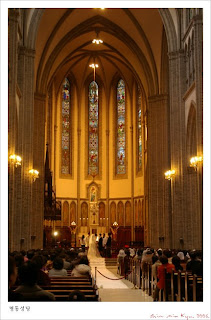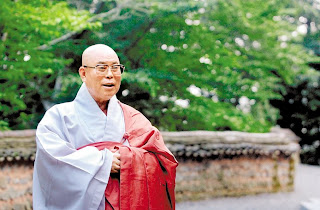2009년 1월 29일 목요일
[int] Asking Directions
Ryu : 오른쪽으로 가셔서 두블럭 더 가세요. 그리고.. 그리고..
Ciara : 그 다음에는요?
Ryu : 몰라요.
Ciara : Excuse me. I'm looking for the nearest police station.
Ryu : Make right and go more two blocks... and...and..
Ciara : and then?
Ryu : I don't know.
----------------------------------------------------------------
<2>
Ciara : 저기요. 경찰서가 어디있는지 아세요?
Kim : 오. 왼쪽으로 가시고 곧바로 가세요. 그러면 보일거에요.
Ciara : 정말 고맙습니다.
Ciara : Hey. Do you know where the police station is?
Kim : Oh. Turn left and go straight. Then, you will see.
Ciara : Thanks a lot.
--------------------------------------------------------------
1. excuse me : 실례합니다.
When you need a help from someone, you can say "실례합니다." It's extremly formal.
And "여기요" and "저기요" are also being used in spoken.
Basically, 여기요 is like "here is." and 저기요 is "there is."
2. I don't know : [저는] 몰라요. (opp. 알아요 = I know)
In Korean speaking, Korean people usually omit subjective when a speakers talk about himself or herself and listeners know the answer is on the speaker.
3. Direction : 방향
좌측 or 왼쪽 : left side
우측 or 오른쪽 : right side
straight : 곧바로
back side : 뒤쪽
front side : 앞쪽
to the back side : 뒤쪽에 ( the preposition 'to' used for direction is "~에.")
그러면 : then
4. more : 더 (opp. less : 덜, 조금)
ex> eat more! (더 먹어) - eat less! (조금 먹어!)
#. This is for people who can read Korean without the English instructions.
Seoul has 25 administrative divisions

--NEW WORDS------------------------------------------
서울[Seoul, sa;ul] : Seoul
~구 [-gu] : a administrative division such as 동대문구, 도봉구, and so on.
2009년 1월 27일 화요일
Get the tailored Korean class for you!
Get the tailored Korean class for you!
- With understdanding Korean things including politics, economy, society, culture, and so on, get Korean languages.
- Basically, the Korean class could be different offline and online.
- Experieced of teaching Korean with English speaking to American, Philiphinos, Sri Lankan, Japanese and lots of Chinese in NY and Seoul. - You can choose teaching language among Korean, English and Chinese.
#. Class Classification
- Practical Intensive Course (Only Offline Available)
- Preparation for the Korean test (Only Offline Available)
- Freetalking
- Learning Koean with k-pops.
- Korean News for you- Disscussion
# You must...
1. take your mind to study and learn Korean crazily.
2. not understand and think on the side of your culture.
3. have positive and critical thinking.
# Ways to learn (you can choose before you learn)
1. Offline (You should be in Seoul or around Seoul.)
- in-person learning
- phone
2. Online
- e-mail (for your writing)
- voice chatting (for your speaking and listening)
- international phone call *- video chatting *
Korean Religion



2009년 1월 26일 월요일
Korean New Year (2)

Korean New Year


2009년 1월 17일 토요일
Words - House
House : 집(jip)
문 [mun] : a door
티비 [tivi] : a TV
전화기[jeonwhagi] : a telephone
휴대폰 [hyudaepon] : a cellphone
탁자 [takja] : a table
의자 [uija] : a chair
책상 [chaeksang] : a desk
책 [chaek] : a book
냉장고[naengjanggo] : a refrigerator
전자레인지 [jeonjarange] : a micro oven.
침대 [chimdae] : a bed
소파[sopa] : sofa
박스[baksu] : box
이불[yibul] : linen
베개[begae] : a pillow
창문[changmun] : window
유리[youli] : glass
컵 [keop] : a cup
유리컵 : a cup made of class
안경[angyung] : glasses
옷장 [otjang] : a closet
"이것/저것/그것은 OOO입니다."
This/That/It is OOO.
You can put those words in the form of the sentence.
----------------------
#. Read these sentences.
1. 이것은 책상입니다.
2. 그것은 침대입니다.
3. 저것은 탁자입니다.
4. 저것은 냉장고입니다.
5. 이것은 베개입니다.
My name is...
I will give a dialogue. If you know how to read Korean, you can learn easily.
------------
류 : 안녕하세요? (ah nyung ha se yo?)
Ciara : 안녕하십니까? (an nyung ha sip ni gga?)
류 : 만나서 반갑습니다. 제 이름은 류입니다. (man na seo bangapsupnida. Je yirumun Ryu ipnida.)
Ciara : 네. 저도 반갑습니다. 제 이름은 씨에라입니다.
(Ne. Jeodo bangapsupnida. Je yirumun Ciara yipnida.)
-------------
Ryu : Hello?
Ciara : Hello?
Ryu : Nice to meet you. My name is Ryu.
Ciara : Ah~ Nice to meet you, too. I'm Ciara.
---------------
# Expressions
Hello = 안녕하십니까 = 안녕하세요 = 안녕
Nice to meet you = 만나서 반갑습니다. = 반갑습니다.
My name is OOO = 제 이름은 OOO 입니다.
# Words
meet = 만나다.
my = 저의 = 제 = 나의
name = 이름
is = 입니다.
# Grammar
만나서 is meant to show your reason that you did or have done.
English word order is subjective, verb, and objective. In Korean, however, the word order is subjective, objective, and verb. (Eng : S+V+O, Kor : S+O+V)
-----------------------------
#. BONUS!!!
I will put this sentence "This is a bag."
"a bag" is said "가방[gabang]" in Korean.
"This" is said "이것은" as well.
Analyze the sentence "This is a bag. "
이것은 (This) - Subjective
입니다 (is) - Verb
가방 (a bag) - Objective
As I wrote, Korean order is subjective, objectictive, and verb. Thus!!
you should think like this.
(this) - (a bag) - (is). = (이것은) (가방) (입니다.)
------------------------
# More~
Now, you know "this" is "이것은". How do korean say "that" and "it"?
- this = 이것은 [yigussun]
- that = 저것은 [geogussun]
- it = 그것은 [gugussun]
Now you can change the sentence "this is a bag" to "that is a bag" or "it is a bag."
---------------------------
# Excercise. Change the sentences to Korean.
1. That is a book. (a book = 책[chaeck])
_________________________
2. This is my dog. (a dog = 개[gae])
_________________________
3. It is a car. (a car = 차[cha])
_________________________
2009년 1월 6일 화요일
Some Words from other languages
- computer : 컴퓨터 [kom pu toe]
- mouse : 마우스 [m a u s]
- monitor : 모니터 [mo ni toe]
- ice cream : 아이스크림[a i s k rim]
- elevator : 엘리베이터[el li be i teo]
- camera : 카메라[ka mae la]
- microphone, MIC : 마이크[ma i k]
- CD : 시디[si di]
- DVD : 디비디[di vi di]
- date : 데이트[de i t]
- coffee : 커피 [keo pi]
- cola : 콜라 [kol la]
- cider : 사이다 [sa i da]
- McDonald : 맥도날드[maek do nal d]
- Burger King : 버거킹[beo geo king]
- Starbucks : 스타벅스[stabeoks]
- donuts : 도너츠[do neo chu]
- pizza : 피자[pi ja]
- spaghetti : 스파게티 [spageti]
- hamburger : 햄버거 [haembeogeo]
- bagel : 베이글 [beigul]
- sandwich : 샌드위치 [saen d wi chi]
- France : 프랑스 [pu lang su]
- Paris : 파리 [Pa li]
- Sri Lanka : 쓰리랑카 [ssu li lang ka]
- India : 인도 [in do]
- Philliphine : 필리핀 [pil li pin]
- Brazil : 브라질 [Bu la jil]
- Singapore : 싱가포르 [sing ga po ru]
- Turkey : 터키[teo ki]
- Sony : 소니[so ni]
- Toyota : 도요타 [do yo ta]
- Nintendo : 닌텐도[nin ten do]
- NOTES
1. Most of countries are called in the same way with common saying.
EX> Brazil, Singapore, Turkey etc...
2. Some brands doing business and franchizing in Korea are called in the original name.
EX> Sony...
3. Foods originated not in Korea are called in the original.
EX> Pizza, Cola ....
- Conclusion
Anything invented, created or made not in Korea is being used with its original sound using all over the world.
At this point, you may have a question how you guess where words from. I would like to give an answer understanding Korean cultural things is the best way to improve your Korean. I think any other language is NEVER understood without understanding its own culture.
If you have any question, you can email to dooliya@gmail.com at your convenience.
Useful Expressions
What will you do?
If you show the korean your expressful body languages, the korean might catch your meaning. However, it's obviously efficient if you say some korean sentences. ( It's okay that you say just only one word meaning of "bathroom.")
How should you say "bathroom" in Korean? You say "화장실."[hwajangsil]
Then, how should you say "I'm in emergency" in Korean? You can say "저 급해요." [jeo guphaeyo]
I will put some korean sentences for the situation on the below.
- a bathroom = 화장실 [hwajangsil]
- I'm in emergency! = 저 급해요! [jeo guphaeyo]
- I wanna go to bathroom = 저 화장실 가고 싶어요. [jeo hwajangsil gago sipoeyo]
- Where is a bathroom? = 화장실이 어디에요? [hwajangsili eodiaeyo]
Tip> When you ask something, you should make your intonation up at the end of the question.
Dialogue>
You : 실례합니다. [sillehapnida] = Excuse me.
Ryu : 네? [ne] = huh?
You : 저 화장실 가고 싶어요. [jeo hwajangsil gago sipeoyo] = I wanna go to bathroom
저 급해요! [jeo guphaeyo] = I'm in emergency.
Ryu : 여기에 있어요. [yeokiae itseoyo] = It's here.
Voca>
- a bathroom : 화장실 [hwajangsil]
- be in emergency : 급해요 [guphaeyo]
- I : 저 [jeo]
- here : 여기[yeoki]
- there : 저기[jeki]
----------------------------
한국어 공부해요~
Let's learn Korean. ^^


